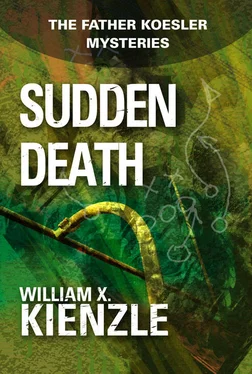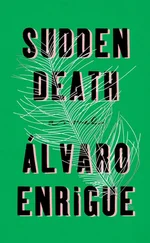William Kienzle - Sudden Death
Здесь есть возможность читать онлайн «William Kienzle - Sudden Death» весь текст электронной книги совершенно бесплатно (целиком полную версию без сокращений). В некоторых случаях можно слушать аудио, скачать через торрент в формате fb2 и присутствует краткое содержание. Жанр: Криминальный детектив, на английском языке. Описание произведения, (предисловие) а так же отзывы посетителей доступны на портале библиотеки ЛибКат.
- Название:Sudden Death
- Автор:
- Жанр:
- Год:неизвестен
- ISBN:нет данных
- Рейтинг книги:4 / 5. Голосов: 1
-
Избранное:Добавить в избранное
- Отзывы:
-
Ваша оценка:
- 80
- 1
- 2
- 3
- 4
- 5
Sudden Death: краткое содержание, описание и аннотация
Предлагаем к чтению аннотацию, описание, краткое содержание или предисловие (зависит от того, что написал сам автор книги «Sudden Death»). Если вы не нашли необходимую информацию о книге — напишите в комментариях, мы постараемся отыскать её.
Sudden Death — читать онлайн бесплатно полную книгу (весь текст) целиком
Ниже представлен текст книги, разбитый по страницам. Система сохранения места последней прочитанной страницы, позволяет с удобством читать онлайн бесплатно книгу «Sudden Death», без необходимости каждый раз заново искать на чём Вы остановились. Поставьте закладку, и сможете в любой момент перейти на страницу, на которой закончили чтение.
Интервал:
Закладка:
“So what did you do?” Harris asked.
“Huh?”
“What did you do to convince him one little pill would be enough?”
“Oh, yeah, right. Well, he wasn’t one to take no for an answer. So I used to give him two pills. . no, not two Dilaudid. The Hun may have been big but he was no horse.” Brown reached again into the medicine cabinet, searching for another container. “I used to give him two pills. But I kept reminding him that one was all he needed. The warning that one was enough, along with always breaking down and giving him a second pill, worked. As long as the Hun thought he was getting double strength, he was satisfied. But the second pill wasn’t much more than a placebo.”
Brown found the bottle for which he’d been searching. He removed the container, opened it, and shook another pill into his hand, where it rested alongside the Dilaudid. He showed both pills to the officers. “Papazole. It’s an-antithyroid-medication, — but-unlike the Dilaudid, it’s of very weak strength. You could take lots of Papazole in this strength without doing yourself any damage. For all practical purposes, the Papazole was a placebo.”
Harris studied the two pills. “You mean you were able to pass them both off as Dilaudid?”
“Sure, the Hun couldn’t tell the difference.”
“Well,” Harris said with some satisfaction, “they look to be the same size and shape, but they’re different colors. I mean, the Dilaudid is yellow and the Papazole is white.”
“Sure. But the Hun couldn’t tell. .” Brown’s voice trailed off; a look of extreme dismay appeared on his face.
“Because the Hun was colorblind.” Harris completed Brown’s statement.’
“Brownie!” Murray exclaimed. “You knew! I thought I was the only one who knew as well!”
“Yes, Brownie knew.” Harris could feel the adrenalin pumping. The familiar euphoria that came with closing in for the kill. “Brownie knew. But Brownie didn’t tell anybody. Why is that, Brownie?”
“I. . I didn’t think it was important.”
“Didn’t think it was important? A man has a condition that affects less than 1 percent of all human males, and you didn’t think it was important? We asked you, first time around, to list all Hunsinger’s impairments and idiosyncrasies. You mentioned his compulsions and astigmatism, but not his colorblindness. Because you didn’t think it was important? You said he had astigmatism, which affects a goodly proportion of the populace. But you neglected to say he was colorblind, a condition so rare it is almost unique? Because you didn’t think it was important!
“Let me tell you what happened last Sunday, Brownie. At ten you left the Pontiac Inn. Instead of coming here as you usually do, you hurried to Hunsinger’s apartment. You already knew about the new security system in the lobby. You were able to study it on the previous Tuesday evening when you came to the meeting of the discussion club. You timed your entrance to the lobby, synchronizing it so you wouldn’t be caught by the sweeping closed-circuit camera. You flipped open the lock with one of your plastic credit cards.
“You went up to Hunsinger’s apartment, got the strychnine, switched the bottles of shampoo and DMSO, poured the strychnine into the DMSO. The liquid in the bottle where the pink shampoo usually rested now was white. But you knew it didn’t make any difference to your plan. The bottles were the same shape and size, just like those two pills you just showed us. You knew it didn’t matter that the liquid in each of the bottles was a different color, just like you knew it didn’t matter that the two pills you always gave Hunsinger, which were supposed to be identical, were, in reality, different colors. The different-colored liquid and the different-colored pills would make no difference to Hunsinger because you knew that Hunsinger was colorblind!
“Then you got out of the building the same way you got in, by synchronizing your exit through the lobby with the moving camera. And you hurried back out here to get here just before the team arrived from the inn. And that’s what you did last Sunday. You killed Henry Hunsinger!”
“It’s not true. I didn’t do it.”
“You got an explanation that’s different from mine? One you can corroborate with any witnesses? You can’t account for two hours last Sunday morning. No one can testify as to your whereabouts for those two hours. We’ve been looking for someone with a motive for killing Hunsinger. You had one: he was corrupting physically and morally everyone on the team he could. We’ve been looking for someone who had the opportunity: I just explained how you did it.
“And finally, we’ve been looking for the ‘smoking gun’-the one who, along with motive and opportunity, knew that color meant nothing to Hunsinger because the poor bastard was colorblind.
“I think we’ve got our man.” As Ewing began handcuffing Brown, Harris removed a card from his wallet and began to read, “You have the right to remain silent. .”
Brown, face ashen, looked at the floor. “I think I’d better talk to a lawyer.”
Father Koesler, even late that day, was still embarrassed by his colossal faux pas. Imagine involving the police in a fallacious guilt theory! He wondered if either Mr. or Mrs. Galloway might sue for something or other. He’d heard of litigation for false arrest. He wondered if there were some such process for false accusation. Of course, neither of them was actually accused of anything. But his had been such an egregious error that he thought mere embarrassment insufficient penalty.
Koesler had not felt so mortified since his school days. Well, perhaps once since then. Oddly, it had been during another homicide investigation. The one in which everyone was looking for a local monsignor who had mysteriously disappeared. That time too he’d had a theory that had proven to be without foundation. Yes, his embarrassment on that occasion had easily equaled his present chagrin. And for roughly the same reason.
When would he settle down and address only the questions he was asked instead of wandering around in a field wherein he was destined to remain an amateur?
It was nearing six o’clock. Ordinarily at this hour he would start dinner and watch the evening news. This evening he decided on only half his ritual. He wouldn’t watch the news. Most likely there would be something about the Hunsinger investigation. There had been every evening, if only to report that there had been no progress. And he didn’t want to be reminded of that investigation and his blundering participation in it. So he put two generous-sized hamburgers on a low fire, then went to his office to begin preparation for next Sunday’s homily.
He had already decided to base his homily on the second Scripture, a reading from St. Paul’s letter to the Romans: “It is rare that anyone should lay down his life for a just man, though it is barely possible that for a good man someone may have the courage to die. It is precisely in this that God proves his love for us: that while we were still sinners, Christ died for us.”
Koesler always seemed to favor these Scriptures that emphasized, explained, or demonstrated God’s incredible love for his creatures. People in general, in Koesler’s view, did not often enough reflect on that reality. They thus missed one of the overpowering sources of consolation in life as well as a magnificent motivation for love of others.
Yet it was strange that he was again focusing on death. It seemed, since the murder of Hunsinger, that he could not escape the subject. And here he was again thinking of Hunsinger. He wished, as he had many times in the past, that he had more mental discipline.
The phone rang. That would distract from the homily preparation. Things simply were not working out very well this day.
Читать дальшеИнтервал:
Закладка:
Похожие книги на «Sudden Death»
Представляем Вашему вниманию похожие книги на «Sudden Death» списком для выбора. Мы отобрали схожую по названию и смыслу литературу в надежде предоставить читателям больше вариантов отыскать новые, интересные, ещё непрочитанные произведения.
Обсуждение, отзывы о книге «Sudden Death» и просто собственные мнения читателей. Оставьте ваши комментарии, напишите, что Вы думаете о произведении, его смысле или главных героях. Укажите что конкретно понравилось, а что нет, и почему Вы так считаете.












